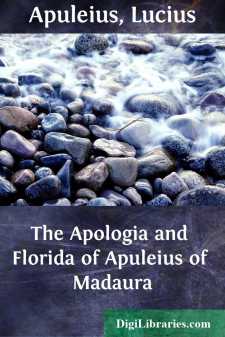Categories
- Antiques & Collectibles 13
- Architecture 36
- Art 48
- Bibles 22
- Biography & Autobiography 813
- Body, Mind & Spirit 142
- Business & Economics 28
- Children's Books 16
- Children's Fiction 13
- Computers 4
- Cooking 94
- Crafts & Hobbies 4
- Drama 346
- Education 46
- Family & Relationships 57
- Fiction 11829
- Games 19
- Gardening 17
- Health & Fitness 34
- History 1377
- House & Home 1
- Humor 147
- Juvenile Fiction 1873
- Juvenile Nonfiction 202
- Language Arts & Disciplines 88
- Law 16
- Literary Collections 686
- Literary Criticism 179
- Mathematics 13
- Medical 41
- Music 40
- Nature 179
- Non-Classifiable 1768
- Performing Arts 7
- Periodicals 1453
- Philosophy 64
- Photography 2
- Poetry 896
- Political Science 203
- Psychology 42
- Reference 154
- Religion 513
- Science 126
- Self-Help 84
- Social Science 81
- Sports & Recreation 34
- Study Aids 3
- Technology & Engineering 59
- Transportation 23
- Travel 463
- True Crime 29
The Apologia and Florida of Apuleius of Madaura
by: Lucius Apuleius
Categories:
Description:
Excerpt
INTRODUCTION
Our authorities for the life of Apuleius are in the main the Apologia, the Florida, and the last book of the Metamorphoses. He has a passion for taking his audience into his confidence, and as a result it is not hard to reconstruct a considerable portion of his life. He was a native of Madaura, the modern Mdaurusch, a Numidian town loftily situated above the valley of the Medjerda. The town was a flourishing Roman colony (), and the family of Apuleius was among the wealthiest and most important of the town. His father attained to the position of duumvir, the highest municipal office (), and left his son the considerable fortune of 2,000,000 sesterces (£20,000). As to the date of Apuleius' birth there is some uncertainty. But as he was the fellow student () at Rome of Aemilianus Strabo (consul 156 a.d.), and was considerably younger than his wife Pudentilla, whom he married about 155 a.d., when she had 'barely passed the age of forty' (), the estimate which places his birth about 125 a.d. cannot be far wrong. His name is generally given as Lucius Apuleius, though the only authority for the praenomen is the evidence of late MSS., and it is not improbable that the origin of the name is to be found in the curious identification of himself with Lucius, the hero of the Metamorphoses (xi. 27). At an early age the young Apuleius was sent to school at Carthage (), whence on attaining to manhood he proceeded to complete his education at Athens (). There he studied philosophy, rhetoric, geometry, music, and poetry (), and laid the foundations of that encyclopaedic, if superficial knowledge, which in after years he so delighted to parade. On leaving Athens he set forth on lengthy travels, in the course of which he spent a large portion of his patrimony (). He speaks of the temple of Hera at Samos as an eyewitness (), and elsewhere mentions a visit to Hierapolis in Phrygia (de mundo 17). Returning from the East he came to Corinth, where—if we may accept his identification of himself with the Lucius of the Metamorphoses—he fell into the clutches of the priests of Isis, who played upon his emotional and superstitious temperament to their hearts' content. He was first initiated into the mysteries of Isis (Metamorph. xi. 23, 24). A few days after this auspicious event the goddess appeared to him in a vision and bade him set forth homewards. He therefore took ship for Rome, where for the space of a year he dwelt, a fervent worshipper at the temple of Isis on the Campus Martius. Once more visions of the night began to afflict him; he consulted the priests and discovered the cause; he required yet to be initiated into the mysteries of Osiris. The priests of Corinth had worked upon his credulity to such good effect, that he found himself in serious financial difficulties, but by practising as a lawyer he succeeded in making a sufficient income to provide more than adequately for the expenses of this fresh initiation (Metamorph. xi. 28, 30). While at Rome he made the acquaintance of Aemilianus Strabo and Scipio Orfitus, men of distinguished position, whom he was to meet again when their official career brought them to Africa as proconsuls of that province (Florida , ).
At last he returned home, and it was probably at this period of his career that he wrote his famous novel, the Metamorphoses or Golden Ass. It is based on the lost work of a certain Lucius of Patras, of which we have another version in the ΛοÐÐÐРлκιος ÐÐÐÑÐÑ ÐÐÐРвÐÑνος, falsely attributed to Lucian....


